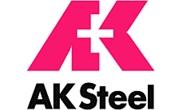Market Segment

December 6, 2014
AK Steel Ashland Furnace Back in Production
Written by Sandy Williams
AK Steel has completed the reline of the blast furnace hearth at its Ashland, Kentucky Works and the furnace is back in full production. The maintenance and reline, which took 27 days, was moved up from 2015 to correct issues that occurred with the furnace earlier this year.
AK Steel reports that the furnace is at full capacity and operating well above pre-outage levels.
“We are very pleased that the Ashland blast furnace is back on-line and operating well,” said James L. Wainscott, Chairman, President and CEO of AK Steel. “Completion of this outage helps position us to serve our customers’ needs for years to come.”
The outage cost the company approximately $19 million in capital investments and $31 million associated with the outage itself and reduced production levels at Ashland Works prior to the maintenance.
The impact on customers was minimized, said AK Steel, through increased production at its other plants and purchase of additional slabs.







